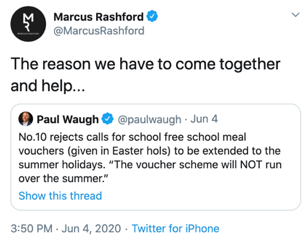A row has erupted over the government’s plans to axe free school meals for children from poorer backgrounds over the summer holidays.
The Children’s Commissioner, Anne Longfield, has described the decision as “short-sighted”, and appearing “uncaring and lacking in compassion”.
The vouchers, introduced during the COVID-19 lockdown measures, are worth £15 per week and are provided to families of children from poorer backgrounds who receive free school meals at school.
“It reflects very poorly on the importance the Government places on children that within £132bn of spending you cannot find a few million pounds to keep children fed”, she wrote in her letter to Chancellor Rishi Sunak.
“I also believe that your decision is exceptionally short-sighted.
“Financial pressures are one of the many issues families are facing at the moment.”
The move is set to affect 1.3 million children across the UK, after new figures have suggested COVID-19 has already sent 300,000 children into poverty.
This comes as Manchester United striker, Marcus Rashford, tweeted on Thursday “The reason we have to come together and help…” after it emerged Number 10 rejected called for free school meal vouchers to be extended into the summer.

The footballer has already helped raise some £20 million, far exceeding the initial £50,000 target set by FareShare – a charity that seeks to provide school children with free school meals.
Speaking to the BBC in March, Rashford described how he received free school meals while at school.
“I remember when I was at school I was on free meals and my mum wouldn’t get home until around six o’clock so my next meal would have been about eight”, he said.
“I was fortunate, and there are kids in much more difficult situations that don’t get their meals at home.”
Child poverty is on the rise in the UK, and expected to increase in the coming months as the consequences of COVID-19 take effect.
In 2018-19, 4.2 million children – or 30% of all children – were living in relative poverty.
And in a report, published by the Children’s Society last month, it was revealed that the North West is above the national average in this area, with nearly a quarter of all children in the area living in poverty.
The Treasury were contacted for a statement in response to Longfield’s letter, but none was provided.
You can find a transcript of the letter to the Chancellor below:
Dear Chancellor,
I am writing about the Treasury’s decision not to fund free school meals over the summer holidays. As Chancellor, you have announced measures in response to Covid-19 which are, by your own admission, exceptionally generous. However, it seems this generosity does not extend to children.
This week we learnt that Covid-19 has already seen 300,000 children descend into poverty, during a Parliament that was already predicted to see the highest rates of child poverty on record. In the same week, the Government announced that children will not get free school meals over the summer holidays. Even before Covid-19 there were nearly 2 million children in families in England classed as ‘food insecure’. The summer holidays are a particularly difficult period for these families, but Covid-19 has exacerbated a range of issue they are facing, not just financial but in terms of the networks of support they can access either formally or informally.
A free school meal is the last line of defence against poverty and hunger for children. When everything else fails, when there are problems accessing universal credit, or families are verging on the edge of crisis, a school meal is the most basic level of subsistence we provide to our children.
At a time when more families are facing pressures than ever before, and so many other sources of support are behind closed doors, the decision not to continue free school meals over the summer holidays appears uncaring and lacking in compassion.
It is particularly unfortunate that the announcement of your decision coincides with figures from the Office of Budget Responsibility showing that the overall package of support you have announced extends to £132bn.
It reflects very poorly on the importance the Government places on children that within £132bn of spending you cannot find a few million pounds to keep children fed.
I also believe that your decision is exceptionally short-sighted. Financial pressures are one of many issues families are facing at the moment. Poor finances are often the trigger for families to move from coping to crisis. Thus, your decision is likely to compound the level of instability some children are experiencing at home and place more pressure on social care in the midst of their response to Covid-19.
It is well established that poverty is one of the main drivers for children ending up in care, which is incredibly expensive for the Government. A Government committed to families, to fairness and to intelligent, preventative spending would not be denying children free school meals over the summer holidays.
I hope you will reconsider.
Yours sincerely,
Anne Longfield OBE, Children’s Commissioner for England



